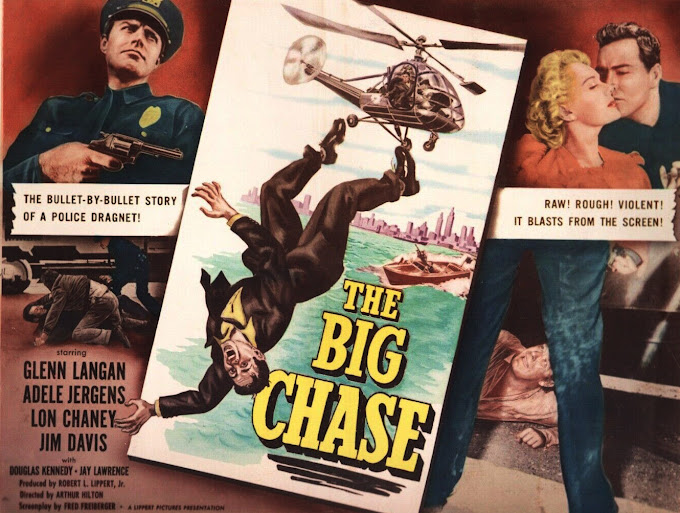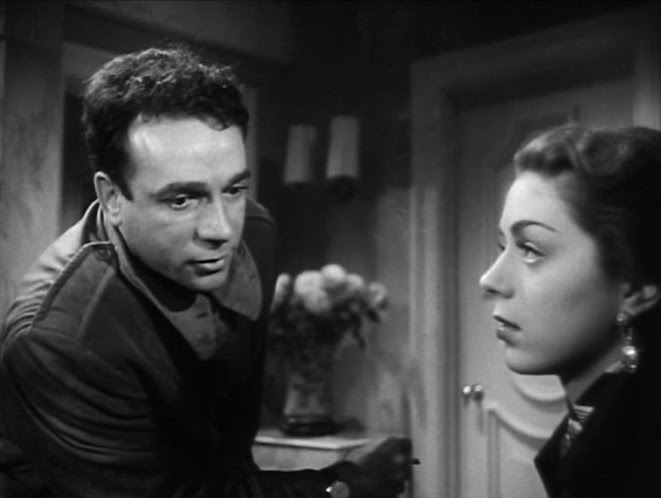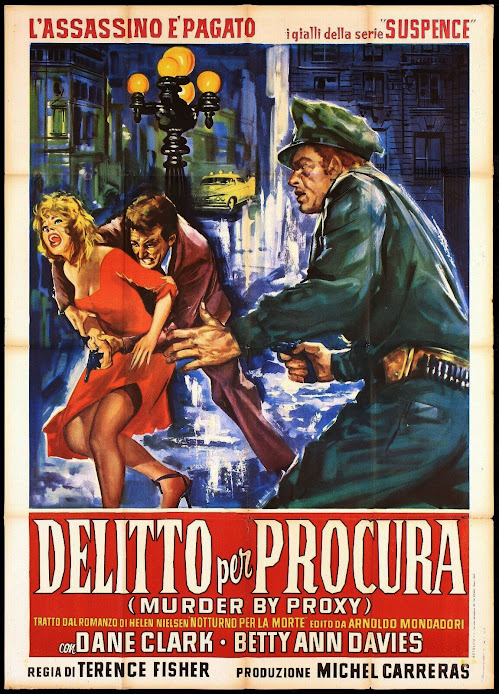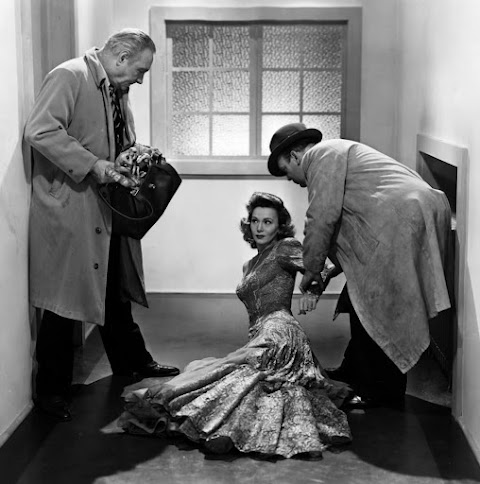Film Noir #26
Noir: The Big Chase, Blackout, Blood Simple, and Brass Monkey
THE BIG CHASE (1954) --- Part of a box entitled “Forgotten Noir: Collector’s Set, Series Three,” from VCI, latter in present custody of the Robert Lippert library, from which these plus numerous other noirs derive. “Forgotten” is a fair label for the lot, but that doesn’t mean they’re bad, at least not all bad. As curiosities each are OK, and for run-times barely past an hour (The Big Chase 60 minutes on the nose), none need go begging for our entertainment dollar. The Big Chase was pillaged from a 3-D featurette called Bandit Island, which got limited play flat or third dimension. Those 26 minutes ended up as final third of The Big Chase, surrounding story cobbled by son of Lippert, Robert Jr., who colorfully told the story to Tom Weaver for a rollicking interview in Earth vs. the Sci-fi Filmmakers, a 2005 collection highly recommended. The Big Chase has a familiar and likeable cast: Glenn Langan, Adele Jergens, Jim Davis, Douglas Kennedy … and who invited Lon (no dialogue) Chaney to the party? Yet here he is, and Lippert Jr. gave Lon considerable credit for bringing off the “big chase” of title derivation. This is breed of dog that history has kept largely in kennels --- it took digital formats to loose them. Laugh if one likes, but men like Lippert (and son) kept theatres open, their own and others, using product like this, and I doubt they felt a moment’s shame over it, nor should they. Anyone careless enough to pay ways into a show like The Big Chase deserved what they got, and who knows, it might have pleased well as anything major studios tendered. There is no accounting in the end for an audience’s taste.
BLACKOUT (1954) --- Another of Hammer noirs fronted by Robert Lippert and featuring an imported American star. Dane Clark was a name, but not one lately associated with tops of bills. Lippert must have estimated bookings to a pinpoint before committing to these, like program westerns on ways out. He had enough theatres of his own to almost pay freight, product generated cheaper overseas than stateside. Hammer had begun shooting at their Bray facility, everyone in close quarters as sets were necessarily small. To look upon ingenuity applied here is to appreciate how well Hammer delivered under very frugal conditions. Despite success that came with horror films, there was always struggle to keep lights on and staff in groceries, making me wonder if distributors didn’t rake off excess bounty the small company might have been entitled to. Hammer after all was no match for giant UK circuits, let alone sharks swimming in the US used to grabbing it all where they could do so unchallenged. Blackout (alternate title Murder by Proxy) has twists enough to engage. I was wrong on my guess as to the killer’s identity, advantage Hammer and experienced writing hand of Richard Landau. Brit support always made Yank leads look good. They let Dane Clark be the big noise without reminding him theirs was the bigger talent. “Journeyman” is a badge of honor where worn by character folk who seemingly could perform anything and had done so for long a time at least as any arriver from the colonies. Hammer was already softening UK accents to make dialogue decipherable. There had been complaints about British speech as heard by American viewership, and an only checkmate to this was training artists to speak in US-plain, a tip Bob Lippert no doubt conveyed at start of all his Brit-lensed projects. Blackout streams here/there, was sold at one time by Kit Parker, but a lot of their UK-noirs appear to have gone out of print, tolls pretty high if we want any of them now.
BLOOD SIMPLE (1984) --- Among first noirs to omit any sense of outrage from mayhem committed on screen. We see a most sympathetic of ragtag characters bury an enemy alive yet think little of it. Just a necessary measure to make us deep accessory to an act seldom done outside horror movies (did it inspire Scorsese’s end for Joe Pesci in Casino?). Blood Simple is entertainment folks would once have been ashamed to watch, that day past as even harsher if less effective noir proliferates today. As Blood Simple approaches a 40 year anniversary, we could dub it Night of the Living Dead of a jostled genre, being shock to all that would still endorse boundaries. Repurposed early 80’s noir more sex-explicit was still rose-hued, comfortably within classic confines despite ramped-up raunch (Body Heat), which “erotic thrillers” to come were rather like perfume ads than odor Blood Simple gives off. Was Blood Simple too near the knuckle for its own commercial good? Modern go’s at noir were far enough afield of reality to unease no one. Detectives private or civic still solved crime, rougher than previous sure, but within safety net that was normalcy we aspire to. Blood Simple tore all asunder and I don’t wonder many were as confused by that approach as narrative that was challenge to keep even with. We see not one authorized investigative figure in a whole of running time, as if they’d left the field to barbaric lot remaining. Noted since is Blood Simple being the Coen Brothers’ first in creative charge. They take paperback nasty to frightful new level, style chased further aground in Fargo (1996), a larger success to suggest audiences had finally caught up with them. Hollywood clearly had, for look at all of imitators since Blood Simple. Best of crime stories make us complicit in evil engaged. It becomes a matter of picking lesser bad among a bad lot and hoping they will at least survive the ordeal, if not profit by damage they do unto others. Blood Simple has violence exhilarating for its savagery, like when Frances McDormand slams a window on a man’s hand then pierces it with a kitchen knife to secure him, a clip I confess to watching several times on You Tube. Maybe Blood Simple is what cultists ought to call “Guilty Pleasure.”
BRASS MONKEY (1948/1951) --- A Brit anomaly, being noir and spun off a popular-over-there radio program featuring Carroll Levis, Canadian born but successful enough in the UK to topline this weirdest of genre mixes. We expect lightweight mystery, but here come at least three murders to muddy water amidst wacky numbers and routines (several performed by Terry-Thomas), parts of a broadcast played out as killings are resolved and an admittedly surprise guilty party is unmasked. “Guest” by way of American personality is Carole Landis, but how could even she increase interest in what was in large part transcription of a British revue not heard ever on our shore? Free passes might have gone to whatever US patron could recognize Carroll Levis. He was sure no Phil Baker. Of reasons to watch (if any), one stands out: Ernest Thesiger, always worth sacrifice of 81 minutes, in fact more if necessary. He's a slightly dotty collector of antique treasure, not murderous, but pursuing goals “at any cost.” Herbert Lom is sinister and largely on sidelines. Landis was hard luck known for details of her ultimate demise, but what I did not realize was fact she contracted malaria during one of many war entertaining tours, that condition being oft-recurrent, so things surely were bleak after cessation of hostilities. Could health have been a factor in her decision to lower life’s curtain? Landis wrote a book that inspired Twentieth-Fox to make a successful film, Four Jills in a Jeep. That should have raised TCF’s estimation of Carole Landis. It is said that Rex Harrison was ostracized for a time following her tragic finish (their affair, and him married to Lilli Palmer). Unfaithfully Yours, released six months after Landis' death, failed in part as result of Harrison starring. There are latter day fans for Landis, fervent ones, her among sadder pages from the Classic Era.








3 Comments:
I picked up Forgotten Noir Part 3 (and Part 1) back when some online DVD store whose name I can't remember constantly ran sales. This was before our cable ran TCM and the program listings were not dotted with channels devoted to 50's westerns and private eyes. 'The Big Chase' was entertaining from what I remember. There's one pretty dicey scene where the gang crosses railroad tracks, barely making it across before a locomotive passes. Not quite as dicey when explained in the commentary but you do find out that Robert Lippert Jr was subsequently banned from railroad property. Also in this disc set was 'Scotland Yard Inspector' with Ceasar Romero. As part of the fun, he concocts an alcoholic drink which defies description, though it only enduces a chuckle from friends.
Around the same time, I also picked up 'Blackout' in the Hammer Film Noir Collector Set Part 1. You got me thinking that I may need to dust off these sets and give them another watch.
Griff adds some welcome detail re Carole Landis and Rex Harrison:
Carole Landis committed suicide in July of 1948. After that, there was a general understanding amongst the public -- no, I'm not clear how this stuff got quickly and widely circulated back in the day -- that the actress was heartbroken or at least terribly distressed over her affair with Harrison, and this was seen as a fundamental cause of her suicide.
Put it this way: if you had asked my parents at almost any point before their passing about Carole Landis, probably the first thing they would have said about her would have been, "poor girl, what a shame." My dad admired Harrison as a farceur, but always had certain reservations about him because of his disastrous involvement with Landis.
Accordingly, this negative public perception apparently remained in the air, likely quite strongly, when Fox's not-inexpensive UNFAITHFULLY YOURS opened late in the year. I think the picture's a near-masterpiece (okay, it's a little bit long) and has scenes as clever and witty as any ever written and helmed by Sturges. But not only does Harrison play an imperious, insufferable guy, he spends a remarkable amount of the film's running time trying to (unsuccessfully) murder Linda Darnell; I don't think a movie with Rex playing St. Isaac would have gone over at this particular point in time, but this didn't help.
The Sturges picture flopped -- which couldn't have helped the filmmaker's confidence -- and Mr. Harrison wisely stepped away from the movies for a couple of years.
Include me among the fervent fans of Ms. Landis. I find anything that she's in worth watching, and will surely seek this one out, which I've missed until now.
Post a Comment
<< Home